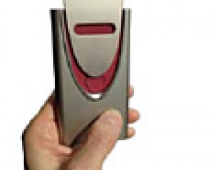
Hitachi plans 500GB hard disk, largest ever
Hitachi said on Tuesday it is seeking to push the limits of data storage with smaller stamp-sized disks for handheld gadgets and vastly higher-capacity drives that can store up to 100 films.
Hitachi, the world's No. 2 maker of hard drives, is looking to propel its 3.5-inch line of drives commonly used to store desktop computer files into new markets for storing massive quantities of data captured by personal video recorders.
But instead of the 40 hours of video, on average, that a standard 80-gigabyte hard-drive might store in a Tivo-type digital video recorder, the new drives can hold 200 hours -- half a terabyte, or more than 500 billion bits of data.
"This is actually quite an exciting time," Bill Healy, Hitachi's head of storage products marketing, said in an interview detailing the company's storage technology plans.
The new drive will be available to electronics manufacturers in the first quarter. Hitachi was previously the first to deliver a 400-gigabyte, or billion byte, disk drive.
The Japanese electronics makers also said it plans to offer a smaller version of its 1-inch Microdrive that takes up one-fifth less space, consumes less power, and can hold eight to 10 billion bytes of data.
The product uses the same-sized one-inch disks but need less surrounding packaging. More than 5 million of the existing line of Microdrives have shipped in products ranging from digital cameras to music players to video cameras.
The smaller drive, a baby Microdrive, is nicknamed "Mikey." It is the first extension of the line in five years. IBM invented the Microdrive but sold its hard drive business, including the Microdrive line, to Hitachi, in 2003.
The new 1-inch drives promise to allow electronic gadget makers to add capabilities to cellphones for storing entire encyclopaedias or recordings of TV broadcasts, Healy said, adding that the Mikey will ship in the second half of 2005.
The drives both tap and, to a real extent, enable the rise of devices that can play back both video and music in ever smaller devices. Hitachi's push into digital entertainment markets seeks to capitalize on the multiplying number of products which use hard disks to store electronic data, from automobiles to living rooms.
"Now we can start counting on our hands and toes the number of hard drives that will be in our homes," Healy said.
But instead of the 40 hours of video, on average, that a standard 80-gigabyte hard-drive might store in a Tivo-type digital video recorder, the new drives can hold 200 hours -- half a terabyte, or more than 500 billion bits of data.
"This is actually quite an exciting time," Bill Healy, Hitachi's head of storage products marketing, said in an interview detailing the company's storage technology plans.
The new drive will be available to electronics manufacturers in the first quarter. Hitachi was previously the first to deliver a 400-gigabyte, or billion byte, disk drive.
The Japanese electronics makers also said it plans to offer a smaller version of its 1-inch Microdrive that takes up one-fifth less space, consumes less power, and can hold eight to 10 billion bytes of data.
The product uses the same-sized one-inch disks but need less surrounding packaging. More than 5 million of the existing line of Microdrives have shipped in products ranging from digital cameras to music players to video cameras.
The smaller drive, a baby Microdrive, is nicknamed "Mikey." It is the first extension of the line in five years. IBM invented the Microdrive but sold its hard drive business, including the Microdrive line, to Hitachi, in 2003.
The new 1-inch drives promise to allow electronic gadget makers to add capabilities to cellphones for storing entire encyclopaedias or recordings of TV broadcasts, Healy said, adding that the Mikey will ship in the second half of 2005.
The drives both tap and, to a real extent, enable the rise of devices that can play back both video and music in ever smaller devices. Hitachi's push into digital entertainment markets seeks to capitalize on the multiplying number of products which use hard disks to store electronic data, from automobiles to living rooms.
"Now we can start counting on our hands and toes the number of hard drives that will be in our homes," Healy said.





















